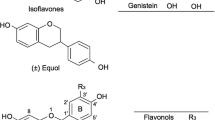Abstract
Objective and design: To determine whether water-soluble constituents of cigarette smoke affect mast cell function using an in vitro model, RBL-2H3 basophilic leukaemia cells.
Materials and methods: RBL-2H3 cells were induced to degranulate in response to compound 48/80 and substance P, as assessed by monitoring the release of the granular enzyme β-hexosaminidase, by treatment for 7 days with 20 μM quercetin. Responses to concanavalin A and antigen were determined by measuring the β-hexosaminidase release from cells cultured on fibronectin-coated plates.
Results: The β-hexosaminidase release response to compound 48/80 induced by quercetin treatment was accompanied by a release of lactate dehydrogenase, suggesting that degranulation is not the only process triggered by compound 48/80 under these conditions. Quercetin treatment reduced the β-hexosaminidase release response to concanavalin A. Precoating of the culture wells with rat fibronectin enhanced the β-hexosaminidase response to calcimycin, but not to concanavalin A. Under these conditions, concanavalin A did not induce a release of lactate dehydrogenase. The responses to c48/80, substance P, calcimycin, concanavalin A and antigen (after IgE pretreatment) were reduced by treatment with cigarette smoke solution obtained from standard and low-tar cigarettes (IR3 and IR5F). The effect of cigarette smoke solution from IR5F cigarettes upon the β-hexosaminidase release elicited by compound 48/80 (in quercetin-treated cells) and by concanavalin A (in cells cultured on fibronectin-coated wells) could be prevented by N-acetyl-L-cysteine, but not with either hemoglobin, α-tocopherol, catalase or palmitoylethanolamide. N-acetyl-L-cysteine also reduced the effect of cigarette smoke solution upon the degranulation response to antigen.
Conclusion: Under the conditions used, oxidants present in cigarette smoke solution from IR5F cigarettes reduce the ability of RBL-2H3 cells to degranulate in response to both immunological and non-immunological stimuli.
Similar content being viewed by others
Author information
Authors and Affiliations
Corresponding author
Additional information
Received 6 December 2002; returned for revision 1 April 2003; accepted by I. Ahnfelt-RøJune 2003
Rights and permissions
About this article
Cite this article
Fowler, C.J., Sandberg, M. & Tiger, G. Effects of water-soluble cigarette smoke extracts upon the release of β-hexosaminidase from RBL-2H3 basophilic leukaemia cells in response to substance P, compound 48/80, concanavalin A and antigen stimulation. Inflamm. res. 52, 461–469 (2003). https://doi.org/10.1007/s00011-003-1202-8
Issue Date:
DOI: https://doi.org/10.1007/s00011-003-1202-8




